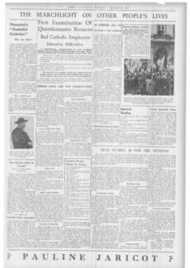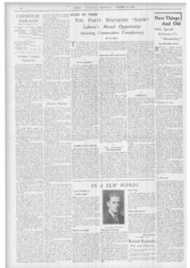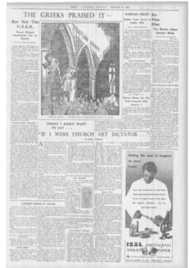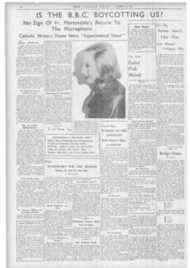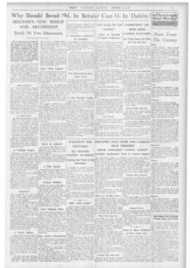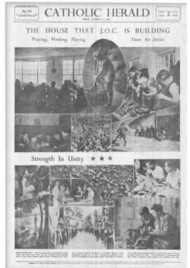Page 13, 15th October 1937
Page 13

Report an error
Noticed an error on this page?If you've noticed an error in this article please click here to report it.
Tags
Share
Related articles
English Saints: Monday Next, October 13, Feast Of St....
Thoughts On The Feast Of St George
Kalendar Of The Week
Edward The Confessor
NOTES FOR RANSOMERS
St. Edward, King and Confessor Edward, the "Good King," whose Feast we celebrated on Wednesday, was the nephew of King Edward, the Martyr. From the age of ten years until he returned to England to ascend the throne, he had lived in exile in Normandy; where at a dissolute Court his 'life of devotion and purity was the admiration of all. It was not until 1042 that he was able to return to England, where he was acclaimed as King by the people.
As a young man in exile, Edward had made a vow to make a pilgrimage to the Tomb of Se Peter in Rome, and when in 1050 the tranquillity of his kingdom seemed to offer an opportunity for the fulfilment of this vow, he began to make preparations for the journey. The When in full meeting, however, begged the King to abandon his project, on the ground that his presence was necessary at home, and St. Edward sent instead an embassy to the Holy See, and obtained froei Pope Leo IX a dispensation from the pilgrimage on condition that he should devote one-tenth of his yearly revenue to the restoration or foundation of an Abbey dedicated to St. Peter.
King Offa's Gift An old document proving the existence of an Abbey at Westminster is dated fien. 785, and is a deed of gift of Offa of Mercia of a manor to "St. Peter and the people of the Lord . . . in that sacred place which is called at Westminster." This Abbey, which had been plundered and in part destroyed by the Danes, was restored by the great St. Dunstan in the tenth century, and a community of Benedictine monks installed there. When Edward the Confessor wished to fulfil the Pope's behest, he turned his attention, then, to this monastery of Westminster; and there he built the noble church on whose foundations the present Abbey stands today, The Abbey church was dedicated to Si, Peter, Prince of the Apostles, in Decentber, 1065, only shortly before the death of the good king who passed away on January 5, 1066; his body was interred before the high altar, and so began the history of that shrine which thenceforth held so sacred a place in the affection of the people of England.
When his tomb was opened on October 13, 1102, in the presence of King Henry I, the body of the Confessor was found to be incorrupt. In 1161 Edward was formally canonised by Pope Alexander III, and subsequently his body was translated, on October 13, 1163, to a stately shrine in the middle of the Abbey church. The anniversary of this translation became the festival of St: Edward, which in 1680 was extended to the Universal Church.
A Misunderstood Figure Few, perhaps, of the pre-eminent figures in English history, are so greatly misunderstood as is St. Edward by modern historians. To most of these writers the Saint appears to have been a failure, and they regard the life of the last Saxon sovereign with regret because he never reached the heroic standard of that worldly success which they consider as essential for a great King. Nevertheless, from 1042 after the death of Hardicanute, the eyes of the whole nation turned to Edward, whom, forgetting their feuds and rivalries, they unanimously chose as their King. The Saint was loved by all his people until the time, twenty-four years later, when his body was laid to rest in the newly consecrated Abbey of which he was the founder. His reign was one of almost unbroken peace, and such was the contentment caused by " the good King Edward's laws," that their re-enactment was repeatedly demanded by later generations when they felt themselves oppressed. Many of those laws, indeed, are still in force as part of the common law of England.
It is characteristic of the failure of the critical modern historian to realise the greatness of the Saint's personality, that one such writer actually uses of another English King, Alfred the Great, as the highest praise that can he given, the phrase, " he was no Inert' Saint"!
No one can be merely a Saint; saectity requires the development of a strong personality to the fullness of its power by the aid of Divine Grace.
blog comments powered by Disqus




